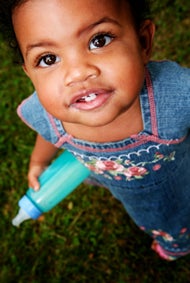
Essential Cross Cultural Communication Strategies and Skills

Effective early childhood mental health consultants must possess a high level of cross cultural communication skills. In addition to the very personal and culturally sensitive aspects of addressing child development, family life, and mental health, two issues dominate concerns about communication in the context of providing mental health consultation to young children, their families, and ECE providers:
- Language, literacy, and differences in non-verbal communication influenced by culture, and
- The challenge of dialoguing and negotiating cultural differences.
Language and Literacy Skills and Practices
Mental health consultants may not speak the same language or dialect as the staff and families they serve. In these circumstances, interpreters will be required to facilitate communication in the consultation process. In general, mental health consultants who do speak the same language(s) as the staff and families they serve may have more effective interpersonal interactions than those who do not. However, communication is not just about language and literacy. It also includes the culturally driven non-verbal and contextual aspects of interactions.
Non-verbal aspects such as eye contact, facial expressions, interpersonal distance, physical contact, and behavior and gestures that show respect are all important considerations in the consulting relationship. Cultural knowledge about staff, families, and community as well as careful attention to and observation of staff and family communication styles and patterns are also essential. Staff and families from high context cultures rely less on verbal communication, and meaning is more heavily derived through shared experience, history, and implicit messages. In contrast, staff and families from low context cultures rely heavily on verbal communications, and meaning is more heavily derived from direct, precise, and logical verbal exchanges (Lynch & Hanson, 2002; Ortiz, et al, 1997). As part of self-awareness, consultants should recognize where they fall on the continuum of high and low context aspects of communication and what adaptations may be required for effective cross cultural communication. Strategies that show respect and may be helpful in communication with diverse children, families, and staff may include:
- Observing the communication styles and patterns of the children and families;
- Showing respect and patience in learning how best to communicate with children, families, and staff;
- Using visuals (photos, pictures, etc.) to aid in communication;
- Learning key words (greetings, family member relationships, to convey respect, to express appreciation, exiting etc.) in the native language of the children and families in the program;
- Engaging bilingual staff and interpreters, prepared for working in the context of mental health consultation, to assist in communicating with families who speak languages other than English.
- Translating important forms and information (Letter of Introduction, consent form, behavior screening and assessment forms, etc.) to insure access for families whose primary language is other than English as well as those with limited reading ability.
Dialoguing Cultural Differences
Differing cultural values and goals as well as diverse communication and interaction styles of program staff and families of infants, toddlers, and preschoolers can influence the way in which both groups view, understand and support child development. When parents’ concepts of development differ from those of program staff the cultural mismatch can make early care and education as well as mental health consultation services and supports less effective for children. Dialoguing differences is a meaningful approach to work through such cultural conflicts. Two models for this important skill are skilled dialogue and dialogue and reflective thinking.
In the book Skilled Dialogue: Strategies for Responding to Cultural Diversity in Early Childhood (2003), Barrera and Corso discuss the challenge of cultural diversity in early intervention and skilled dialogue as an essential skill for those working with young children and their families. They describe skilled dialogue as: “An evidence-based approach for transforming difficult conversations; a tool for establishing respectful, reciprocal and responsive interactions between people holding diverse perspectives, whether due to cultural backgrounds, gender, experience, beliefs or other factors, and a framework for breaking out of dualistic either-or thinking and generating more inclusive “third” options.”
Skilled dialogue is less about knowledge of diverse cultures and more about the process of relationship building based on respect, reciprocity, and responsiveness. Skilled dialogue and its two component skills – Anchored Understanding of Diversity and 3rd Space – offer a framework for facilitating cross-cultural interactions that early childhood mental health consultants can use to build collaborative relationships with staff and families from diverse communities and help navigate cultural differences.
- Anchored Understanding of Diversity: refers to the “experiential” understanding of cultural differences through personal interaction and the “cognitive” understanding that the behavior of others, from their perspective and worldview, make as much sense as one’s own.
- 3rd Space: refers to moving from a dualistic, exclusive perception – “either/or” – to exploring multiple perspectives – “separate but together” – in a way that promotes respect and reciprocity and an opportunity for collaboration.
In the resource A Place to Begin: Working with Parents on Issues of Diversity (1999), Pulido-Tobiassen and Gonzalez-Mena describe dialogue and reflective thinking as strategies to resolve conflicts and reach a shared understanding when faced with differences in cultural perspectives and practices between families and ECE providers. Consultants and child care providers must first be willing learners; gathering specific information about a family’s culture and child-rearing practices, and suspending judgment in order to be respectful of the meaning behind these practices. Consultants, providers and parents can then engage in reflective dialogue and discuss ways to assure “consistency of care” in the contexts of home, early care and education, and among all caregiving adults involved with the child.
These similar concepts from both models fit well with the early childhood mental health consultative approach. Effective consultants must become skilled at practicing and facilitating reflective dialogue in the work of consultation in order to learn from each party’s culturally influenced perspective, build relationships, identify conflicts, reach mutual understanding and work together on behalf of the young child and family.
